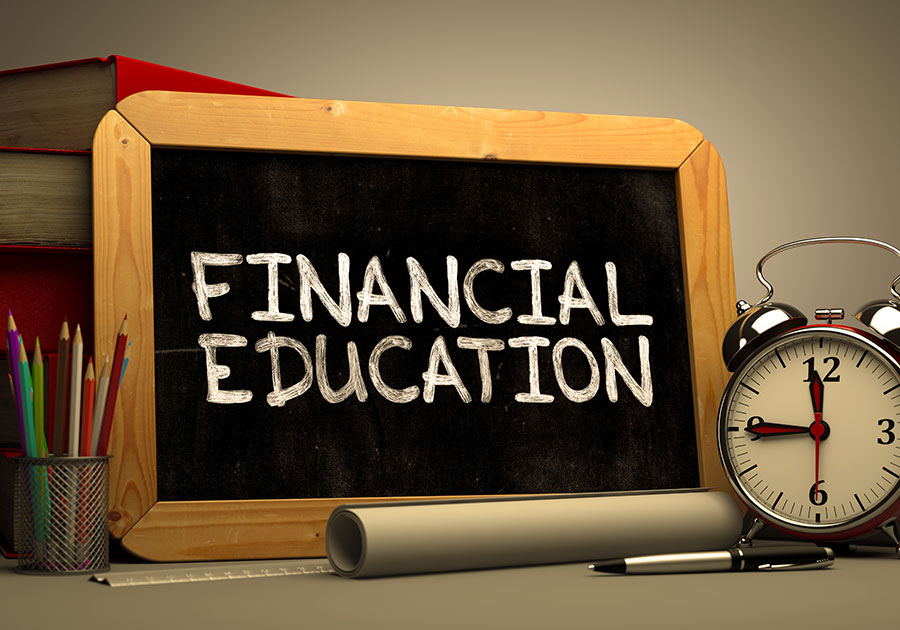Good financial decisions and habits are built on a strong financial education. There is no doubt that financial illiteracy remains an issue, not just in schools, but amongst all ages in the population. When it comes to financial education, the impacts can easily extend to be long term, and manifest in lifelong financial habits that can either elevate or deteriorate your financial life, starting from the time college students sign on for student loans to the end of their career and their post-retirement goals. The extent and power that a financial education can have on both your immediate and life long goals, habits and direction is felt regardless of your age or your social or academic standing, and shows itself to be all the more reason to make it a priority from a young age.
Financial Education Removes The Barrier Of Ignorance When It Comes To Cost Of Credit

Only 50 percent of consumers find themselves properly equipped to manage the debt they are carrying. While a part of the reliance on credit stems from little or no choice for some households and a rampant credit culture, it can also be attributed to consumers being unaware of what the terms and consequences actually mean. It is only when credit limits and payment dates are surpassed, that consumers are then faced with the reality of these consequences, and find themselves grappling with how to juggle and manage their debt in the best way without impacting other aspects of their lives, such as their credit scores.
Financial education is all about giving consumers the right tools to handle any financial education, including managing their debt. With a better level of financial literacy, consumers are able to enter into credit agreements much more aware of what comes with it. In 2017, 1 in 3 consumers didn’t know basic personal finance terms, while in 2015, almost 60 percent had little or no knowledge about their credit scores and what contributes to them, according to LendingTree’s Financial Education pulse survey.
Being Better Equipped With Financial Tools Means Higher Chances Of Saving And Lower Debt Reliance
Being financially educated means more than learning about the various credit terms; it provides insight into tricks behind building your wealth. For a reduced reliance on debt, one must have more control over their income and more disposable income and savings. To build up savings, one must practice certain habits. This does not just apply to personal savings or your child’s college savings either. Approximately 38 percent of employees prioritize saving for holidays over retirement, while 78 percent of them do not intend to prioritize long term savings in the workplace. As a result, 78 percent of them are unprepared for retirement, while many cannot afford to retire at the standard age of 65. It is recommended that workers set aside 10-17 percent of their income, yet many of them are unaware of how much they are falling short. It also equips employees with better knowledge concerning the benefits of growing their retirement portfolio by opting for low-risk timed financial instruments in their investment portfolios. In a sense, you can say a financial education unlocks the culture of saving, and the after effects extend to many other parts of our lives, debt and retirement included.
A Financial Foundation Sets You On The Path To Achieving Major Life Goals

As we move through life, each stage comes with its own set goals and milestone moments, such as buying a home, starting a family, sending your child(ren) off to college and preparing for retirement. However, the common thread amongst these milestones? They all involve money. Good financial habits such as saving, budgeting and living within your means are all common recommendations when trying to achieve any of these life goals. In fact, your financial habits begin influencing your path to these goals long before they become immediate. Mortgage lenders look at credit scores and histories which are built up over time, and saving for retirement is better done over time and steadily.
Your financial education also forms a foundation for your family’s future. Taking the appropriate steps to provide for your family, such as building up emergency savings and securing medical and life cover, are all good steps to secure your family’s future, and their importance is highlighted only through financial enlightenment. Finally, being a financially literate person improves your child’s life and boosts your ability to pass on this knowledge so that they, in turn, may grow up to be financially responsible adults.

